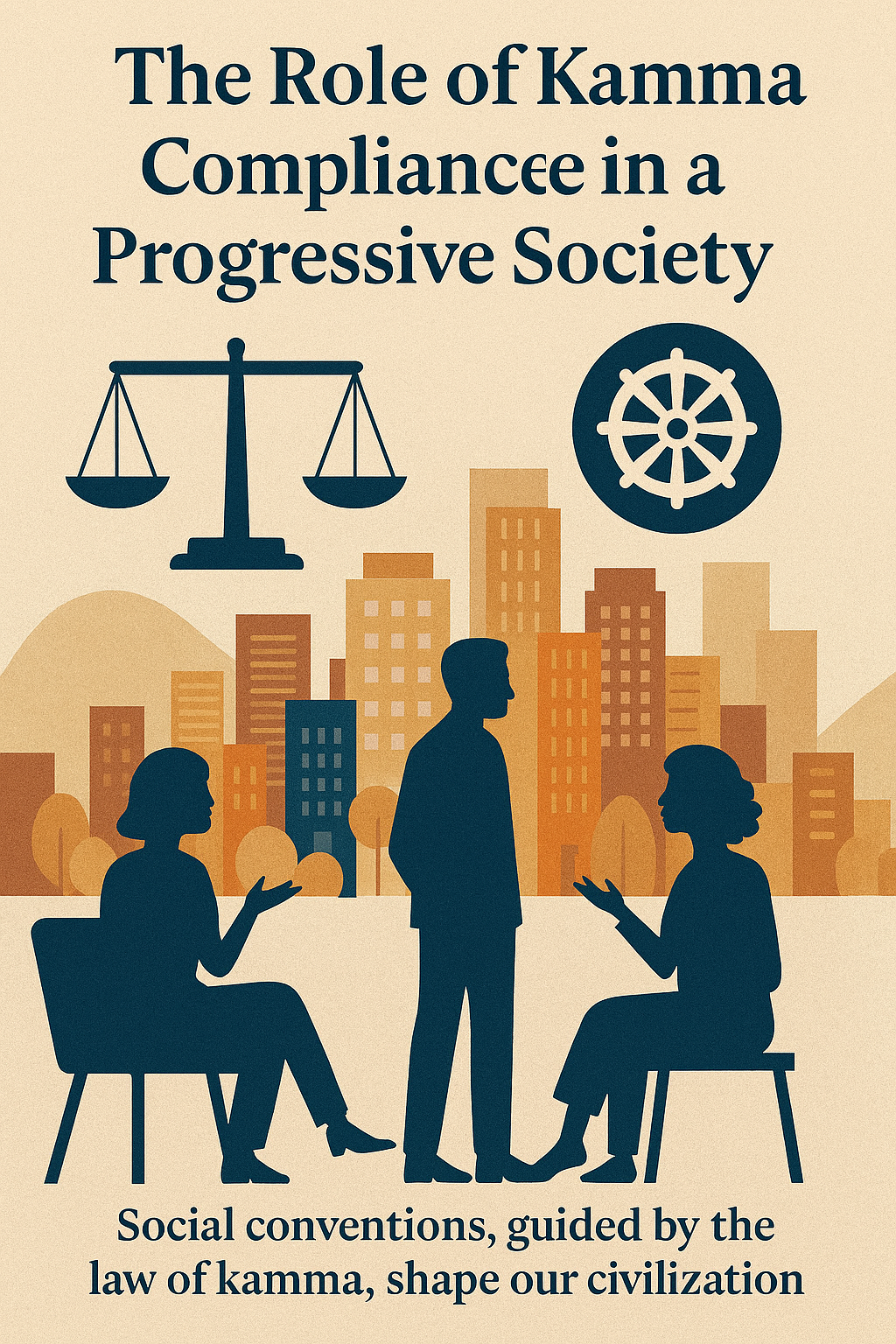The Role of Kamma Compliance in a Progressive Society
Explore how social conventions, guided by the law of kamma, shape our civilization. This blog discusses the importance of evaluating conventions for their societal benefits and how online legal services can support human progress and ethical governance.
5/8/20245 min read


Progressive social convention. Kamma is directly concerned with good and evil, any discussion of kamma must also include a discussion of good and evil. Standards for defining good (kusala) and evil (akusala) are, however, not without their problems. What is good, and how is it so? What is it that we call evil, and how is that so? These problems are in fact a matter of language. Sometimes the practice of good (kusala) can be based on a desire. A child's good behaviour and discipline (kusala) can be based on a desire to show off to its elders (akusala); a student's zeal in learning (kusala) can stem from ambition (akusala). Similarly, anger (akusala), seen in the light of its harmful effects, can lead to wise reflection and forgiveness (kusala); the fear of death (akusala) can encourage self-reflection (kusala): these are all examples of akusala as an agent for kusala.
Take for an example, a young teenager, being warned by his parents not to associate indiscriminately with others, he takes no notice of it and is tempted into criminal activities, stealing activities, sexual misconduct, false speech or drug addiction by his friends. On realizing his situation, he is at once angered and depressed. Remembering his parents' warning, he may be moved by their compassion (evil (akusala) as an agent for good (kusala)), but this in turn may merely aggravate his own self-hatred (good (kusala) as an agent for evil (akusala0). These changes from good (kusala) to evil (akusala), or evil (akusala) to good (kusala), occur so rapidly that the untrained mind is usually unable to see them.
The law of kamma has a very intimate relationship with both psychological laws (cittaniyama) and Social Convention. The law of kamma is so closely related to psychological laws that they seem to be one and the same thing, but there is clear dividing line between the two, and that is, intention (cetana). This is the essence and motivating force of the law of kamma.
The issue that creates the most doubt is the relationship between the law of kamma and Social Convention. Ambiguity arises in regard to the nature of good and evil, giving rise to questions such as, "What is good? "What is evil?", "What is the standard for deciding between good and evil?". People often say that good and evil are human or social inventions. One action in one society, time or place, may be said to be good, but in another society, time and place may be said to be not good. One kind of action may be acceptable to one society, but not in another. Some sects teach that to kill animals for food is not bad, while others teach that to harm beings of any kind is never good. To say that good and evil are matter of human preference and social decree is true to some extent. Even so, the good and evil of Social Convention do not affect or upset the working of the law of kamma in any way and should not be confused with it. Good and evil as social conventions should be recognized as Social Convention. As for good and evil as qualities of the law of kamma. Even though the two are related they are in fact separate things and have very clear distinctions. The point of difference, between this natural law and the Social Convention is intention or will.
When one member of a society refuses to conform to one of its conventions or infringes it. In doing so, that person will be acting on a certain intention. This intention is the first step in, and is therefore a concern of, the law of kamma. In many societies there will be an attempt to search out his intention for consideration in the judgement of that infringement. That is again a concern of Social Convention, indicating that that particular society is wise and knows how to utilize the law of kamma. The law of kamma begins to operate simultaneously with the response to the intention which produced that infringement. Simply speaking, the deciding factor in the law of kamma is whether the intention is good or evil. When society agrees to abandon or to reform any particular convention, then in that case no intentional infringement of that social convention. Society may or may not make these regulations with a clear understanding of good and evil.
A progressive society with wise administrators uses the experience accumulated from previous generations in laying down the conventions and laws of society. These become the good and evil of Social Convention and ideally should be harmonious with the good and evil of kammaniyama. The ability to establish a social convention in conformity with the law of kamma would seem to be a sound norm for determining the true extent of a society's progress or civilization.
Some conventions, even though maintained by societies for long periods of time, are in fact not at all useful to them, even from the point of view of Social Convention, let along from the point of view of the law of kamma. Such societies should agree to abandon those conventions, or it may be necessary for a wise being with pure heart to encourage them to do so.
There are three kinds of action. Bodily action, verbal action and mental action. Cetana, or intention, is the heart of kamma. Thus, an intention which comprises good (kusala) is skillful intention (kusala cetana) or skillful action (kusala kamma). An intention which contains evil (akusala) is unskillful intention (akusala cetana) or unskillful action (akusala kamma). When those skillful or unskillful intentions manifest through the body (bodily actions), speech (verbal action) or mind (mental action), they are known as skillful and unskillful kamma through body, speech and mind respectively, or alternatively, bodily kamma, verbal kamma and mental kamma which are skillful and unskillful respectively.
If it is just a question of intellectual feeling of sympathy towards everybody, then there is no problem about it, but when it comes to doing something concrete in somebody's interest, then a choice has to be made. Once cannot serve the Society as a whole, it is only through the service of particular individuals that the society can be served. The choice of a particular individual or of a few individuals is inevitable. Society in general can be praised, but individual or individuals alone can be served. Therefore, the service has to be rendered, as far as possible, with as less an amount of attachment as feasible. Service of any individual or individuals without getting particularly attached to them is "feeling of sympathy for everybody" on the practical plane.
Bhagwan Buddha said that one who would tend upon me, should tend the sick. Where a lay householder is available to tend upon a lay sick person, a Buddhist monk should encourage him, should persuade him, should instruct him and make him tend another sick person. If no lay householder is available near at hand, he should himself also tend a sick person. Everybody recognizes and accept the existence of suffering.
Progress
Empowering society through legal conventions.
Wisdom
Justice
contact@socialconventionlawyer.org
+91-9483179803
© 2025. All rights reserved.
PHONE / MOBILE
Contact us now
SOCIAL
Last Updated: 26 September 2025
Visitors Count
